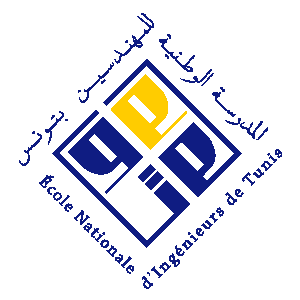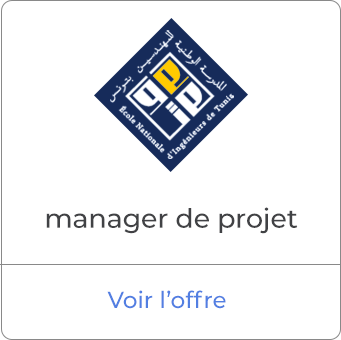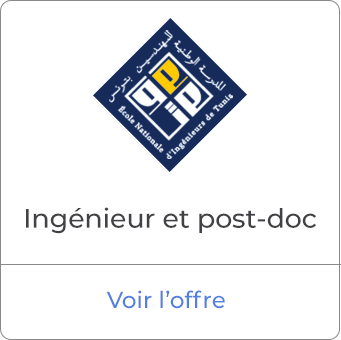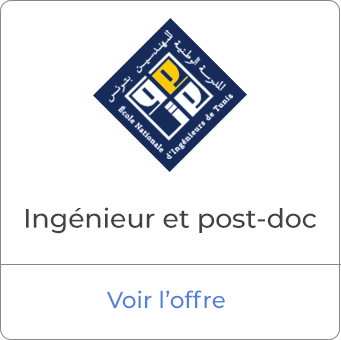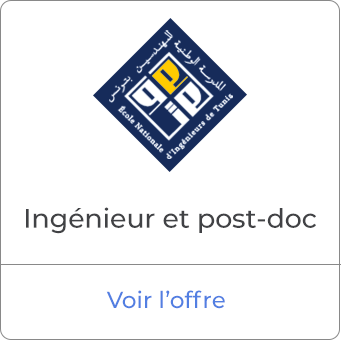Presentation of the school
Founded in the late sixties (Law N ° 4161 of 31/12/1968), ENIT is the oldest of the engineering schools of Tunisia. The founder – and first director of ENIT – is Mr. Mokhtar LAATIRI, a Tunisian engineer and senior official. Since its creation, ENIT has continued to be entrusted with decisive national missions. Polytechnic of vocation, it provided to the young Tunisian state which had just recovered its independence, its high technical executives who laid the bases of the civil and industrial infrastructure (electrical production, factories, dams, road networks, works, etc.) . Such infrastructures have largely contributed to sowing the springs of the economic development of Tunisia today.
Similarly, during the 1980s, it spun over some of the youngest engineering schools enriching the Tunisian panorama of engineering education today. Lastly, ENIT has been and continues to be a renewable pool of experts and senior executives of the State, with recognized expertise in the fields of higher education, research and engineering.
CHIFFRES CLéS
GOALS
diploma training for engineers in trades meeting the actual or potential needs of the market, permanent and distance training to sharpen the performance of practicing engineers, research, innovation and transfer of know-how through technological valorization and entrepreneurship.
At ENIT, there are 224 permanent teachers, 37% of whom have the highest grades in Tunisian higher education (Professors and Masters of Conferences). More than 170 contractors account for almost 20% of ENIT’s teaching load.
In addition to the initial training of engineers, ENIT has a mission of research and training through research. The latter is conducted within ENIT’s Doctoral School of Engineering Science and Technology, which offers eight (8) doctorates, seven (7) research master’s degrees and three (3) professional masters degrees. It has more than 1000 registrations and is based on the twelve (12) Laboratories and the six (6) Research Units of ENIT. These research structures cover all the specialties of the School and develop research programs related to national priorities (Water, Energy, ICT, etc.).
Openness to the socio-economic environment is a recognized tradition and experience for ENIT. ENIT is a partner of various Tunisian companies – public or private – covering all the specialties of the School as well as the numerous subsidiaries of international companies established in Tunisia. This partnership is reflected in agreements that also cover research contracts or continuing training contracts. ENIT, through the UTM, is a member of the Agence Universitaire de la Francophonie (AUF). She is also a founding member of the International Conference of Training Institutes of French Expression Engineers and Technicians (CITEF) and the Mediterranean Network of Engineering Schools (RMEI).
ENIT has two (2) demonstrators of electrical production, the first photovoltaic of 45kWc and the second thermodynamic concentration of 60kWc. ENIT has three (3) units of common research services that provide analysis and testing services to students, researchers and businesses alike. These units consist of:
- A vector network analyzer
- a universal machine for dynamic and static tests
- A multi-layer system production unit having a scanning electron microscope, a high temperature optical microscope, a vacuum group, an impedance analyzer, a spectrophotometer and a sputtering.
The ENIT library has a collection of more than 32,000 titles, the collection of engineering techniques and access to electronic resources through subscriptions managed by the National University Documentation Center. Scientific and Technical (UNCSTD).
Community life
ADENIT Association:
ADENIT aims to ensure the links of contact and cooperation and to strengthen the bonds of friendship between its members, to contribute for the development of the school and its influence and the support to preserve the intellectual level of the graduates, to train its members for the integrate into professional life and help them to enrich their general and professional knowledge as well as to facilitate cultural and scientific and technical communication between them, to create cultural and scientific relations with associations inside the country and outside. . Site web : http://adenit.com.tnthe International Association for the Exchange of Students for Technical Experience
History :
Go back in time, imagine in 1945: a torn world and the hope of man to build a better world.In this context, were born the United Nations and several other international organizations. In 1948, seven European countries: France, Finland, Sweden, Switzerland, Belgium, Norway, the United Kingdom founded the International Association for the Exchnage of Students for Technical Experience at Imperial College London.
L’ IAESTEis an apolitical non-governmental body maintaining consultative relations with UN bodies. Today, IAESTE has more than 64 member countries and 23 other cooperants. The association has enabled, since its creation, the exchange of 250,000 students around the world. he national committees of the different countries form the active members of the association. Their role is not only the collection of internship offers from industrialists to exchange them during the General Conference, but also the reception and supervision of students during their internship period ranging from 6 weeks to 48 days. month
IAESTE Tunisia :
Eleven years after the creation of the association, Tunisia is finally welcomed as an observer withinIAESTE. It was not until 1989 that the work done by the Tunisian committee was judged to comply with all the requirements set at the international level; Tunisia is thus accepted as a full member of the internationalIAESTE, thereby benefiting from the right to vote.Over the past ten years, the Tunisian committee has continued to expand its activities and improve the quality of its services in order to consolidate its position. It should be noted in this respect that the international regulations are uncompromising, countries such as Italy, for example, have been rejected by the association.
The Tunisian committee aims to improve the image it has come to offer thanks to the work done in recent years. We challenge ourselves to collect quality internships in Tunisian companies and research laboratories and to offer our foreign trainees a pleasant stay faithful to the reputation that Tunisia has forged on the international scale. This is how we can extend the fabric of our relationships in order to offer the greatest number of our students the opportunity to gain a variety of professional experience and learn about foreign performance in technology and industry.
The association currently sits at the National School of Engineers of Tunis. The National Office ofIAESTE Tunisia is composed of a secretary general, a function traditionally attributed to the general secretary of ENIT, and a dozen young student volunteers.
Access
map

38, 514, 515 + les lignes spéciales

ligne n°5

